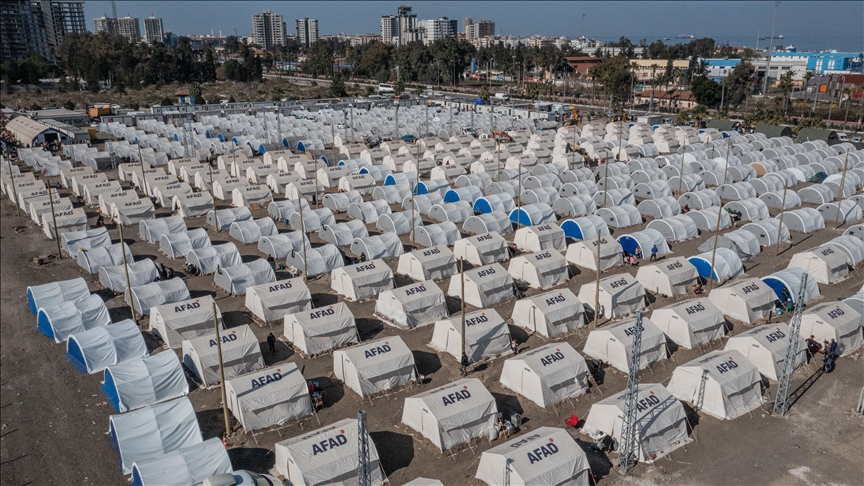

Türkiye’s emergency and disaster authority AFAD stated that the search and rescue operations have come to an end as Minister of Urbanization announced that they are planning for the reconstruction operations to start early March. (Photo: AA)
Entering the second week after the two major earthquakes and thousands of aftershocks that devastated Türkiye and Syria, the death toll continues to rise amid a few reports on “miracle rescue” of victims taken out of the rubble defying the limits of the human body.
Türkiye’s emergency and disaster authority, AFAD, announced on February 18 that the number of people who have lost their lives in the earthquake has risen to 40,642.
Throughout the two weeks after the quake, the region continued to be shaken with more than 5,000 aftershocks, the largest of which was 6.6 in magnitude, increasing the impact of the disaster.
Aside from a few reports of “miracle rescues,” emergency response teams are being replaced one by one by the efforts to clear the rubble.
It is thought that there are hundreds or even thousands of bodies under the ruins.
The AFAD Head: “The rescue operations are almost finalized”
AFAD Chief Yunus Sezer said on February 18 that the search and rescue operations in the 10 provinces have almost come to an end.
“It will almost be finalised by February 19,” he said adding that search and rescue operations are continuing to be carried out, especially in Hatay, Adıyaman, and Kahramanmaraş.
“In Hatay, search and rescue operations were being carried out in about 200 buildings yesterday. Today, it is down to 98. As of tomorrow, we will have come to the end here to a great extent. Likewise, we have 19 buildings left in Kahramanmaraş. Our work continues here, including on the Ebrar Site. We will hopefully come to the end here as well. Again in Adıyaman, work continues in one building, the Çınar Site,” he said.
“There is a great concentration of rescue operations in Hatay province. About 13,000 search and rescue personnel are working there,” he added.
Construction is scheduled to start in March
Murat Kurum, Minister of Environment, Urbanization, and Climate Change, stated that the ministry is planning to initiate the reconstruction process in early March.
“We will initiate joint work in 10 provinces as of the beginning of March. We will make stage-by-stage tenders following the determinations regarding all areas, such as material supply, to manage the construction process in all areas,” he said on February 18 in Gaziantep’s Nurdağı district.
“We will take steps to meet the prior needs within 2-3 months, then we will start construction by making plans in the city center. We are starting the processes by the end of February, and we will start construction simultaneously at the beginning of March,” he added.
Thousands of structures were damaged
According to Minister Kurum, the ministry has conducted damage assessment inspections in 11 provinces and examined 684,000 buildings. He said that 90,000 of them were marked as heavily damaged or collapsed.
A few hours later, Vice President Fuat Oktay said that 830,000 buildings were assessed, and the number of damaged buildings was 105,000.
“Approximately 49 percent of each building surveyed is undamaged,” Oktay said, adding that after the repair efforts, 73 percent of the buildings can be habitable.
The country’s emergency authority, AFAD, has started to pay 10,000 Turkish Liras to every household that is affected by the earthquakes.
For a family to receive the aid, their residency has to be assessed by the related ministry and approved to be damaged, either heavily or mildly.
According to AFAD head Sezer, more than 682,000 families have received that aid, and 164,000 families are yet to receive it.
Domestic migration: A million transferred
Following the earthquake, the inter-city roads were filled throughout the week with cars and trolleys carrying thousands of people fleeing the disaster-stricken cities, which were home to 13.5 million citizens.
Social media and communication lines of civil solidarity initiatives are inundated with messages from people looking for homes, rentals, or shelter in major cities like Ankara and Mersin.
Messages indicate a reluctance to go to Istanbul, where geologists are warning of a big earthquake likely to happen.
AFAD’s chief Sezer said that more than 430,000 earthquake victims were transferred from the cities.
Taking the collapsed buildings into account, the number of people who have been relocated or migrated is likely to reach millions.
Shelter is a priority
For those who have stayed in the earthquake zones, either unable to travel or waiting for their loved ones to be taken out of the ruins, the situation is dire.
It is reported that the most urgent need in the region is for tents and shelter, especially with the temperatures dropping to minus 30 degrees in winter conditions.
Especially in Hatay, Malatya, Adıyaman, and Kahramanmaraş, which have been hit hardest, shelter, basic food and hygiene assistance, and security issues are still reported to be the primary concerns.
Investigations about the constructions
The reasons for the scale of the demolition have become the focus of prominent discussion in Türkiye in the second week of the earthquakes.
Officials have announced that investigations into the contractors of the collapsed buildings have begun.
On February 11, the Ministry of Justice sent a letter to the prosecutor’s offices in the provinces to establish Earthquake Crimes Investigation Offices.
The prosecutor’s office identified 309 suspects as having responsibilities for the construction of the collapsed buildings, 83 were arrested, 62 were released with judicial control.
The investigation included the alterations to the “zoning documents,” which is one of the items in the discussion about the demolitions.
Legal experts from all over the country have asked for evidence to be gathered on the buildings that have fallen down so that they can be looked into further.
Türkiye’s Bars Association has also developed an application for citizens to collect evidence from the ruins for future investigations.
They state that the investigation should be expanded to include all parties liable for the collapse of buildings, not just contractors or builders but also political authorities.
It was reported that 294,166 unsafe or low-quality buildings have been granted registration certificates in 10 provinces in the last 5 years, within the scope of the building amnesty scheme introduced by the ruling AK Party government.
Education suspended; unattended children is a concern
Education in 10 provinces affected by the earthquake was suspended until March 1, possibly to be postponed.
Some people don’t agree with the decision to switch all universities in Türkiye to online education and give earthquake victims state dorms until the end of the summer.
One of the concerns after the earthquake was about the children who lost their families, who were not accompanied by a relative, and whose identities could not be determined.
According to the information compiled from social media calls, the Disaster-Child Civil Coordination Team, which was established by civilian initiative, announced that it had received missing report information for at least 160 children until February 12.
The Ministry of Family and Social Services announced the establishment of a call centre for unaccompanied minors affected by the earthquake.
Vice President Oktay stated that as of February 18, the number of children who are registered by the related authorities is 1713.
244 of these children are still not able to be identified.
He said that 1141 of these children were reunited with their families. There are 82 children currently staging at the state facilities.
Looting, theft, and security
One of the controversies in the earthquake zone has been looting and theft.
Due to the damage to police stations in the region and the involvement of security forces in search and rescue teams, there are allegations that the perpetrators of looting and theft were not apprehended and that suspects who were apprehended were subjected to torture.
According to the Human Rights Foundation of Türkiye’s Daily Human Rights Report, it was claimed in the news coverage of February 12 that 3 unidentified people were lynched in the Defne district of Hatay.
The Contemporary Lawyers Association claimed that Ahmet Güreşçi, Sabri Güreşçi, and four unnamed people were subjected to ill-treatment, and Ahmet Güreşçi lost his life after being detained by gendarmerie in Hatay on February 11.
A state of emergency
The Turkish parliament has approved a presidential decree issued just days after the earthquakes declaring a state of emergency in ten provinces for three months.
Under the state of emergency, public institutions, as well as real and legal persons, will be obliged to provide the public with all kinds of items requested from them, such as land, land, vehicles, etc., when requested.
Regional governors will be appointed to ensure coordination between cities under the state of emergency. Regional governors will have the authority to request assistance from the highest military command in the region until help arrives when deemed necessary.
If deemed necessary, curfews, bans on meetings and demonstrations, and restrictions on entering and exiting the city can be imposed in cities where a state of emergency has been declared.

